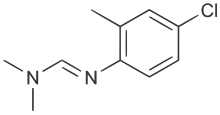Chlordimeform
Appearance

| |
| Names | |
|---|---|
| IUPAC name
N′-(4-chloro-2-methylphenyl)-N,N-dimethylmethanimidamide
| |
| Other names
Chlorphenamidine; Chlorfenamidine; Fundal; Galecron
| |
| Identifiers | |
3D model (JSmol)
|
|
| ChemSpider | |
| ECHA InfoCard | 100.025.637 |
| KEGG | |
PubChem CID
|
|
| UNII | |
CompTox Dashboard (EPA)
|
|
| |
| |
| Properties | |
| C10H13ClN2 | |
| Molar mass | 196.68 g·mol−1 |
| Appearance | White crystalline solid |
| Melting point | 32 °C (90 °F; 305 K) (225-227 °C, hydrochloride) |
| Boiling point | 163–165 °C |
| 250 mg/L | |
Except where otherwise noted, data are given for materials in their standard state (at 25 °C [77 °F], 100 kPa).
| |
Chlordimeform is an acaricide (pesticide) active mainly against motile forms of mites and ticks and against eggs and early instars of some Lepidoptera insects.[1] After the International Agency for Research on Cancer reported sufficient evidence that its major metabolite, 4-chloro-o-toluidine, was a carcinogen, its use has ceased and its registration has been withdrawn in most countries.[1]
References
[edit]- ^ a b c Chlordimeform, International Program on Chemical Safety, World Health Organization
